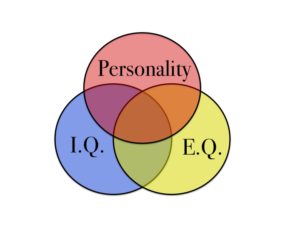Emotional Intelligence 2.0 suggests that people are the combination of Intelligence Quotient, personality and emotional intelligence (E.Q.). I.Q. and personality are established and unchangeable. E.Q. can grow and develop. Bradbury and Greaves argue, therefore, that we should focus on increasing our emotional intelligence to better our lives and become more successful.

Their book is insightful and helpful largely because it is so simple. By improving your self-awareness you can manage your strengths and weaknesses better. Similarly, by growing in social awareness you can manage your relationships better. It’s one of those books you read and then wonder why you didn’t read it long before, like The Seven Habits of Highly Effective People or Strengths Finder 2.0. Each chapter includes over a dozen practical, doable suggestions to grow in that quadrant of your E.Q.
As I read the book it struck me how perfectly this model of growth fits with Christian discipleship. If you place the Gospel at the center of the matrix, it changes from a self-help book into a handbook for total life transformation.

Accurate self-awareness should lead a person humbly to the cross of Jesus Christ to be forgiven. Experiencing the grace of God and becoming a new creation in Christ, filled with the Holy Spirit, provides the power for the believer to manage him or herself in line with God’s will. Similarly, clear social awareness – sensitivity to the needs of others – should lead us humbly to the cross of Jesus Christ to receive His power and direction for ministry.

So there it is: Gospel-centered Emotional Intelligence. Humble self-awareness that leads to conviction of sin and a life of confession and repentance connects the believer with the life-transforming power of the Gospel to live a holy life of wholehearted devotion to the Lord. Likewise, a heart filled with the love of God for hurting and broken people, when shaped by the cross of Christ produces a fruitful life of service and mission.
